When John D. Hawke took the helm of the Office of the Comptroller of the Currency at the age of 65, some in the agency figured it would be a relatively short stint to cap a distinguished legal and government career.
But Hawke, who died Monday at the age of 88, would go on to serve as comptroller for six years during a tumultuous period in which the legal parameters of the national bank charter were a source of intense debate.
He came to the OCC in 1998, after already having established himself as an experienced public servant and one of the preeminent banking lawyers of his time. Before becoming comptroller, Hawke had worked on Capitol Hill, the Federal Reserve and in the senior levels of the Treasury Department, among other roles.
“We thought it might be a kind of last hurrah,” Rafael DeLeon, who worked 32 years as an OCC examiner and senior executive, said of Hawke's time at the OCC.
But Hawke, who was known in Washington as "Jerry," worked to end so-called rent-a-charter arrangements between national banks and payday lenders. He also triggered a major controversy at the end of his tenure, promulgating a controversial preemption rule that shielded national banks from oversight by state-level banking authorities.

The rule placed Hawke, who was appointed by President Bill Clinton, on the receiving end of fierce criticism from Democratic lawmakers as well as consumer advocates. They claimed the regulation undercut anti-predatory-lending laws passed by states. But Hawke remained steadfast in his conviction that the National Bank Act exempted national banks from state oversight.
“I can’t compromise a constitutional principle,” Hawke told an American Banker reporter in 2004. “I didn’t invent the preemption doctrine.”
In the OCC's history, only three other comptrollers ran the agency longer than Hawke, who served under both Clinton and President George W. Bush. By contrast, over the past six years, six different comptrollers have led the national bank regulator, most of them in an acting capacity.
Hawke “just jumped right in,” said DeLeon, currently a director at MainStreet Bancshares in Fairfax, Virginia. “He understood the agency and you could see his love for banking. … He was one of the most impressive comptrollers I’ve seen.”
DeLeon said he was tasked occasionally with briefing Hawke and recalled that it was easy “getting him up to speed.”
“There was no learning curve,” DeLeon said. “He knew Washington and he knew politics inside and out.” Other comptrollers may have had equally sharp legal minds, DeLeon added, “but they didn’t know Washington, or they didn’t know banking. … Seeing how [Hawke] tackled problems was fun to watch.”
Hawke received his undergraduate degree from Yale and his law degree from Columbia. He began his career as counsel to the House of Representatives Select Subcommittee on Education. Hawke quickly moved to the private sector and the powerhouse Washington law firm Arnold & Porter in 1962. He established the firm’s financial institutions practice and served as its chairman from 1987 until 1995.
With the exception of stints as general counsel at the Fed from 1975 to 1978, under secretary of the Treasury for domestic finance from 1995 to 1998 and as comptroller, Hawke practiced law at Arnold & Porter for nearly 60 years.
Melanie Fein, an Arnold & Porter colleague, described Hawke as “the most brilliant banking lawyer of his time.”
“He was an incredible legal scholar,” Fein said. “He had a very insightful way of writing. He taught me and several others at Arnold & Porter. He built a great team and was just such a great teacher.”
One of Hawke’s signal achievements in his private practice was his representation in Board of Governors of the Federal Reserve System v. Dimensional Financial Corp. in 1985. In that case, he helped convince the U.S. Supreme Court, in an 8-0 decision, that nonbank financial services providers were not subject to regulation by the Fed.
H. Rodgin Cohen, senior chair at Sullivan & Cromwell in New York, said Thursday that Hawke was “certainly the preeminent banking lawyer of his era.”
One of Hawke’s great strengths, Cohen added, was his ability to move seamlessly from private practice to public service.
“I don’t think people thought of him as a Democrat or a Republican. They thought of him as a dedicated public servant doing the right thing,” Cohen said. “He was able to earn the respect of everybody he dealt with, including across politics.”
Cohen recalled an episode when he witnessed a Fed chairman, whom he did not name, interview a candidate for general counsel after Hawke had left the central bank.
“The chairman said, 'I have always thought that the right example was Jerry Hawke. If you could be my Jerry Hawke, that’s what I would expect of you,’ ” Cohen said.
Hawke was born June 26, 1933, in New York. After graduating from Yale, he served in the Air Force, entering Columbia Law School after completing his military service.
As a law student, Hawke served as editor-in-chief of the Columbia Law Review. He also clerked for Judge E. Barrett Prettyman on the U.S. Court of Appeals for the District of Columbia.
Hawke’s marriage to Josephine Marie Reddan lasted from 1962 until her death in 1991. The family plans to hold a private burial on Martha’s Vineyard to be followed by a memorial service later this year.





